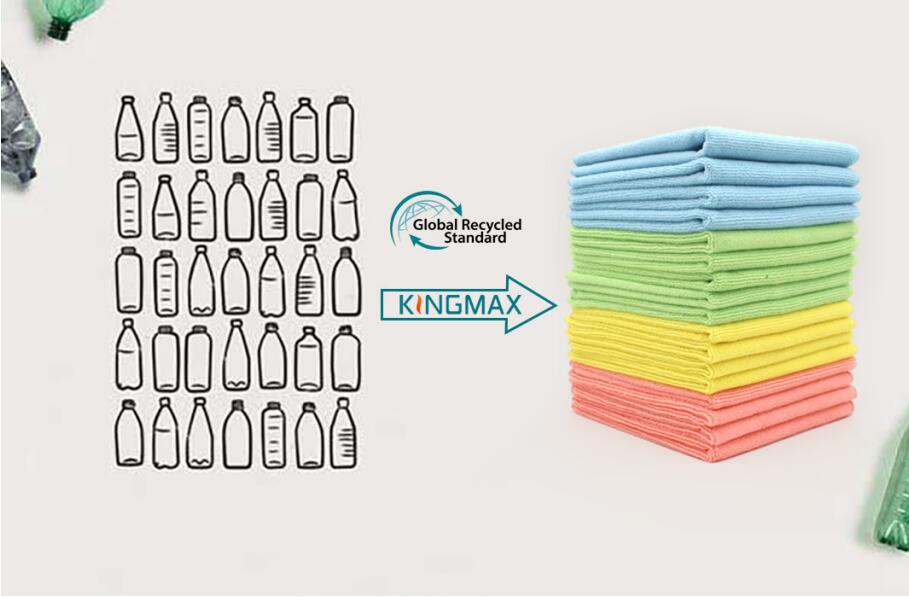As a microfiber cleaning cloth and mop manufacturer, Kingmax has always been at the forefront of innovation and quality. Today, we are proud to announce the launch of our latest product: the 100% RPET Universal Towel. This isn’t just any ordinary towel — it’s a groundbreaking step towards sustainability, designed with eco-conscious consumers in mind. Made from recycled polyethylene terephthalate (RPET), our universal towel is set to revolutionize the way we think about cleaning, sustainability, and the future of textiles.

What Is RPET and Why Does It Matter?
RPET stands for recycled polyethylene terephthalate, a material derived from recycled plastic bottles. Before recycling, PET is better known as polyester, which is a synthetic material commonly used in a variety of products. Instead of letting discarded plastic bottles pile up in landfills or, worse, end up in our oceans, RPET offers a second life for these materials, reducing the environmental footprint caused by plastic waste.
Every year, millions of tons of plastic waste are produced, with a significant portion ending up in landfills or polluting our oceans. This waste can take up to 700 years to decompose, releasing harmful microplastics into ecosystems in the process. However, with innovations like RPET, we’re turning that waste into a valuable resource, transforming it into durable, versatile fabrics.
The Magic of the 100% RPET Universal Towel
The 100% RPET Universal Towel is no ordinary towel. At Kingmax, we’ve combined the sustainability of recycled materials with advanced textile technology to create a product that not only performs exceptionally but also makes a positive impact on the environment.
Unmatched Absorbency and Durability
One of the standout features of the RPET Universal Towel is its incredible absorbency. Thanks to the unique properties of RPET fibers, this towel is designed to absorb moisture quickly and efficiently, making it perfect for a wide range of uses. Whether you’re drying dishes, wiping down surfaces, or using it as a gym towel, its superior absorbency ensures optimal performance.
Eco-Friendly to Its Core
By using 100% RPET, we’ve created a towel that aligns with our commitment to sustainability. For every ton of RPET fabric produced, six tons of oil are saved. This process not only conserves valuable natural resources but also reduces air pollution and greenhouse gas emissions. In fact, the production of RPET fabric requires 85% less energy and 90% less water than virgin polyester production, making it an eco-friendly choice that significantly reduces our environmental impact.
Moreover, using RPET reduces carbon emissions by approximately 25.2 grams for every plastic bottle recycled. It’s estimated that one RPET towel saves about 0.52 cc of fuel and 88.6 cc of water, contributing to a greener future with every use.
A Towel for Every Occasion
The RPET Universal Towel is designed to be versatile, making it perfect for a wide range of applications. Whether you need a towel for your home, gym, or travel bag, this product has you covered. Its compact size and lightweight design make it easy to carry, while its quick-drying properties ensure it’s always ready for the next use. Plus, the towel’s strong fibers make it resistant to tearing, ensuring it lasts through even the toughest cleaning tasks.
The Pros and Cons of RPET: Why We Chose It
Every material has its advantages and disadvantages, and while RPET is far more sustainable than virgin polyester, it’s not without its challenges.
Pros:
Sustainability: RPET is made from recycled plastic, reducing the need for virgin materials and minimizing plastic waste.
Energy Efficiency: Producing RPET fabric requires significantly less energy and water than traditional polyester.
Durability: RPET fibers are strong and long-lasting, making them ideal for products that need to withstand heavy use.
Versatility: RPET can be used in a variety of products, from clothing and accessories to cleaning supplies like our Universal Towel.
Cons:
Microplastics: Like other synthetic fibers, RPET can shed microplastics when washed. However, this issue can be mitigated through the use of filters or special laundry bags designed to capture these fibers.
Cost: RPET can be slightly more expensive to produce than virgin polyester, although this gap is closing as demand for sustainable materials grows.
Despite these challenges, we believe that the benefits of RPET far outweigh the drawbacks, and we are committed to continuing our efforts to reduce our environmental impact.
Join Us in the Fight for a Greener Future
As a leader in the microfiber cleaning industry, we believe that every small action counts, and with the RPET Universal Towel, we’re doing our part to make the world a cleaner, greener place — one towel at a time.
So why not make the switch? Experience the difference that eco-friendly, high-performance cleaning can make with the Kingmax 100% RPET Universal Towel. Together, we can clean up the planet, one bottle and one towel at a time.
Media Contact
Company Name: Shanghai Kingmax Commodity Co., Ltd.
Contact Person: Maxime Shen
Email: Send Email
Country: China
Website: https://www.kingmaxclean.com
